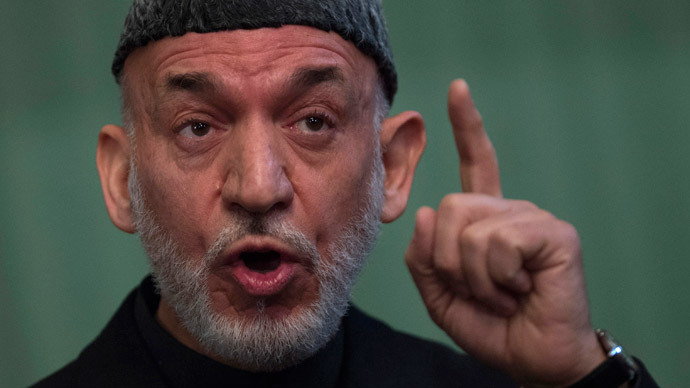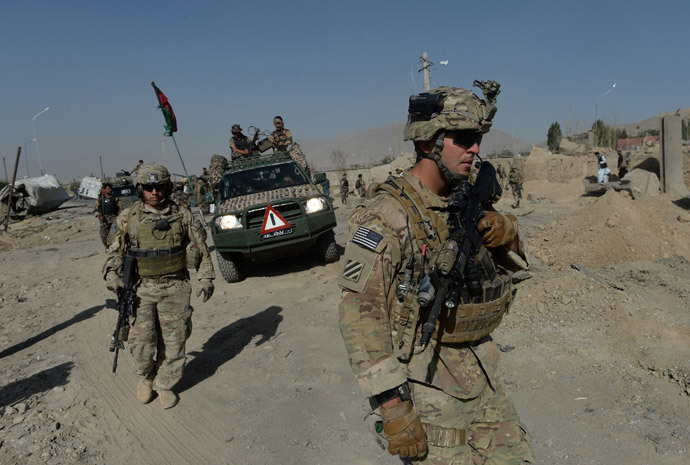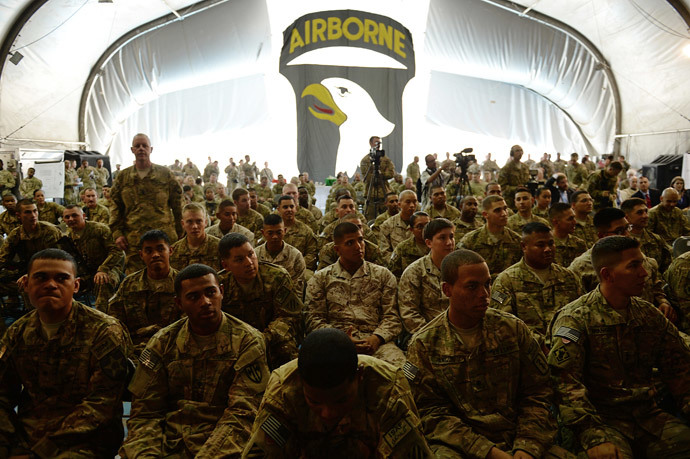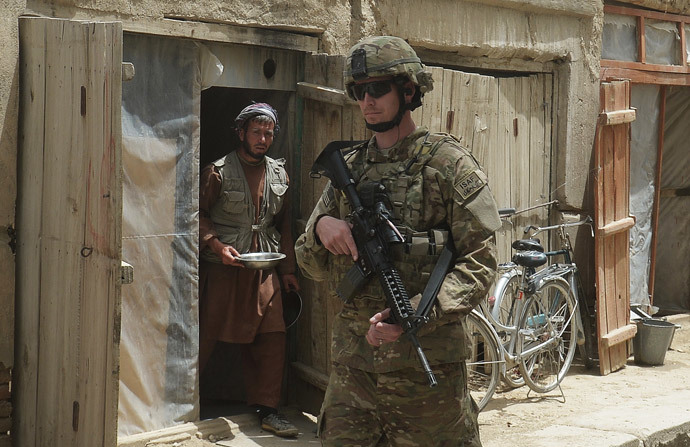Security pact with US to become a challenge for the next Afghan President

The future of the Afghan-US security pact, which would allow US troops to stay in the country, is likely to get into the hands of Karzai’s successor, since Hamid Karzai shows reluctance to sign the deal.
“This pact should be signed when the election has already taken place, properly and with dignity,” President Karzai told at the Loya Jirga assembly of tribal elders on November 21.
The US Administration in its turn is considering to postpone the deal till the new Afghan president takes office.
“If he's [Hamid Karzai] not going to be part of the solution, we have to have a way to get past him,” an unidentified senior US official told Wall Street Journal on February 10. “It's a pragmatic recognition that clearly Karzai may not sign [the deal] and that he doesn't represent the voice of the Afghan people,” he added.
Statements like that prompt an idea that the United States has exhausted its potential while trying to make President Karzai obey implicitly the Washington’s will. Ironic enough, the US has been supporting Karzai for so many years, building a puppet regime in Afghanistan and when the time to sign a crucial for the US security pact has come, President Karzai has shown his firmness and reluctance almost for the first time ever. And now, when so many efforts, money and military support was put into Karzai, Washington gives up and prefers to wait till somebody more compliant or amorphous takes the office. Does it show American weakness or, on the contrary, rationality?
The Obama administration was hoping to sign the long-lasting bilateral security deal by the end of 2013, however, Karzai was in no rush. In November 2013 Karzai told an assembly of 2,500 tribal elders and political leaders from across Afghanistan that an agreement would have to wait until after the presidential election in April 2014.
According to a draft plan, the US would like to leave 15,000 troops to maintain security and counter-terrorism operations in the region until 2024. Some consider these security provisions to be an open invitation for foreign troops to remain in the country. The deal also implicates that these troops would be under the jurisdiction of the US and not be subject to Afghan courts. This particular demand would not be welcomed by Afghan people who blame American soldiers for the killing of innocent civilians and various abuses.

Though the Loya Jirga council and the country’s parliament have both approved this deal, President refused to sign it. Karzai’s decision, which came as a surprise even for the closest of his allies, means that he is not going to take responsibility for letting the US contingent stay in the country beyond 2014. At the same time the Afghan-US bilateral security agreement remains an indispensable condition for NATO’s presence in Afghanistan since this deal makes legal basis for foreign military presence in the country, otherwise they would have to leave the country.
In January 2014 the NATO chief Anders Fogh Rasmussen made a statement that Karzai was unlikely to sign a pact and would probably leave the choice for his successor. It means that the US troops will remain in the region at least till April, when presidential elections are due to be held, though there is no guarantee that the deal would be signed by a new President.
Troubled polls
The April 5 elections are the Afghanistan's third presidential election campaign, which takes place in a very unstable situation. Actually, it’s not even clear whether the elections take place on this particular date or will be rescheduled. Furthermore, the Taliban has pledged to disrupt the voting, while the official government does not exercise control over the whole territory of Afghanistan.
At the same time the very choice of a new political leader also poses the full range of questions concerning the future of Afghanistan. The most vital issues are domestic and regional security, building strong government institutions, social reforms, including rights of women, economy, opium trade and the Taliban. All these aspects are, in fact, directly and indirectly connected with the Afghan-US security pact. First, that’s the new president to decide about this deal. Second, the US military presence should help Afghan security forces tackle three factors of concern: security, opium trade and the Taliban. Third, it’s the US who contributes most to the Afghan economy, with the US goods making up 29,1% of total Afghanistan’s import. And finally, it’s obvious that the security pact will go beyond the issue of the US military presence, with Washington interfering into Afghan domestic affairs.
Though the electoral process is going to be accompanied by various challenges, some make rather positive forecast.
"It is the first time in our history that an elected president will replace another elected president in Afghanistan .... I'm quite confident that this time the election will give a good result for the future of Afghanistan," Zalmai Rassoul, one of the candidates, said in October 2013.

“It's going to work much better this time - we have learned our lesson from the last two elections. We are better prepared,” he added.
However, “better preparation” doesn't mean that the 2014 elections won’t be marked by fraud and that the country’s independent monitoring commission has finally become independent. In fact, polls of 2009 still raise some doubts concerning their legitimacy.
Another concern is the Taliban. Not only it threatened to disrupt elections but the Taliban is still rather strong opponent whose influence shouldn't be underestimated. At the same time it’s impossible to exclude the Taliban from the political scene of the country. However, a hope to improve relations between the official government and the Taliban and take the latter to the table exists. On February 5 Karzai’s spokesperson Aimal Faizi confirmed that President Karzai is engaged in secret talks with the Taliban, which reportedly wants to join the Afghanistan peace process.
“I can confirm that ... Taliban are willing more than ever to join the peace process,” Aimal Faizi said. “Contacts have been made and we are also in touch with them.”
Nevertheless, the Taliban didn't confirm this fact but if the talks did take place, it is quite possible that the Taliban is just playing for time by pretending to negotiate, whereas they exert their power and influence so as to fulfill their political objectives and continue to carry out attacks. Indeed, the secret talks have resulted in nothing as the Taliban isn't willing to make any concessions and stop the attacks.
The Taliban has no candidate to run at the elections, therefore, it can’t get to the power legitimately. But if the new president turns out to be relatively weak and no security deal is signed with the US, the Taliban will simply take over. In fact, the Taliban has its backers among the population and it is more “welcomed” than foreign troops.

Where the wind blows
Initially there were 11 possible candidates for the presidential post in Afghanistan, including one woman. Some of them have fallen off, some new have claimed their willingness to run for the elections, and for the moment there are still 11 but different candidate, with only six of them are considered to have a real chance to gain the power.
On February 5 five out of six front-runners participated in a television debate, presenting their political programs and road maps to resolve the long-standing Afghan crisis. This Western-type TV debate took place in Afghanistan for the first time in its history and obviously drew attention not only of the Afghans but of the West as well. The debate was organized two months before the presidential elections that the US and other Western allies hope will consolidate stability since their military forces prepare to leave after nearly 13 years of war.
One of the main topics was related to the peace talks with the Taliban, and all participants of debates supported the idea of a negotiated settlement with insurgents, aimed at persuading them to lay down arms and cut ties with terrorist organizations. Though, some of them, in particular, Zalmai Rassoul, who is seen as one of Karzai's closest confidants, and Ashraf Ghani Ahmadzai, a former finance minister who ran unsuccessfully in the 2009 presidential elections, condemned the Taliban for the killing of innocents and suicide attacks. Ghani also mentioned that some members of the Taliban were “forced because of corruption and injustice to take up arms.” Another candidate, Abdullah Abdullah, the leader of the largest opposition party and one of Karzai's main rivals, emphasized the idea that if the Taliban shows unwillingness to reach peace, “there is no other way than to face them.”
While the front-runners share the opinion concerning future relations with the Taliban, the candidates have very different backgrounds, which affect their stance on other issues and attract various parts of the society, as well as parties involved. Moreover, it’s obvious that in situation when it’s impossible to name a leader of the race each party involved (i.e. Hamid Karzai and the US Administration) has its own “preferences”.

If consider the current President Karzai, the candidates the most preferred by him should be Zalmai Rassoul and Qayum Karzai. Both of them have always been the closest allies of the President and his main advisers. Rassoul, an ethnic Pashtun like Karzai, could actually be a consensus candidate among many political factions. As to Qayum Karzai, a businessman and the elder brother of President Karzai, who mostly lives in the US, he is believed to have his brother's tacit support, though the President claimed he would stay neutral. At the TV debates Qayum Karzai argued that a political solution to the insurgency and rooting out corruption would be his priorities. However, many Afghans are frustrated with the current government's corruption, and therefore, his chances aren't that big. All in all, in case of Qayum Karzai’s victory the power will be shared between two brothers. Though, if Zalmai Rassoul wins the elections, Hamid Karzai still will be able to remain “a power behind the throne”.
The more important question is which candidate is backed by the United States. Hamid Karzai, who initially had many points in the Western opinion, managed to undermine all US hopes in his 11 years in power. Nothing surprising that now the choice of Karzai to lead to state is seen by West as a big mistake. Given this, it’s quite possible that none of Karzai’s allies can get the US support.
If consider the US interests, Ashraf Ghani Ahmadzai and Abdul Rahim Wardak are the candidates that suit the most American agenda, and therefore, it seems that Washington would stake on one of them. Both of them were educated in the US, both are respected and trusted by the Western leaders. In other words, Ashraf Ghani Ahmadzai and Abdul Rahim Wardak are seen as “their guys”. Moreover, Ghani is one of the strongest proponents of the Afghan-US security pact. As regards Wardak, he argued during debates that his eight years as defense minister made him an ideal candidate for the position of Afghan President.
"I have an achievement ... the creation of Afghan army from scratch," he told Reuters earlier.
The last two potential leaders of the race are one of the main Karzai rivals Abdullah Abdullah, who came in second place in the 2009 elections with 31 percent of the vote, and Abdul Rab Rasoul Sayyaf, an influential former lawmaker and religious scholar. In a country with complicated ethnicity situation Abdullah has an advantage in that he is of mixed Pashtun and Tajik ancestry. However, while he has a strong following among ethnic Tajiks in Afghanistan's north, he has struggled to win over Pashtuns at large. Abdul Rab Rasoul Sayyaf, a Pashtun and charismatic speaker, may appeal to Afghanistan's large number of religious conservatives. Nevertheless, Sayyaf is one of the most controversial candidates because he was one of the few hard-line Islamist commanders during the 1990s civil war.
Whoever the future Afghan leader will be, it’s obvious that Washington will have to cooperate and find compromise with him, so as to maintain American presence and involvement in the country. However, a leader backed and probably led to the power by the US would remind the times when Hamid Karzai became the head of state. Does it mean that Afghanistan will probably see the second Karzai in power, a new puppet led by Washington? In fact, it’s highly possible and that would mean that gloomy days for Afghanistan aren't drawing to the end.
Irina Sukhoparova, RT
The statements, views and opinions expressed in this column are solely those of the author and do not necessarily represent those of RT.
The statements, views and opinions expressed in this column are solely those of the author and do not necessarily represent those of RT.











